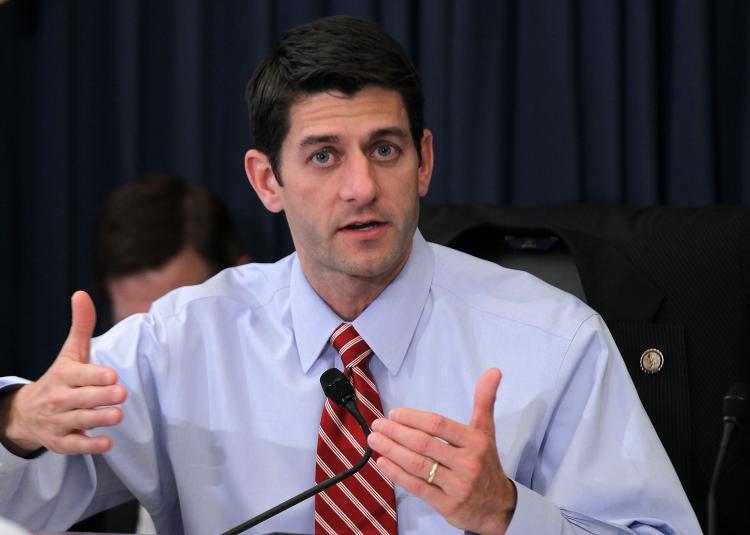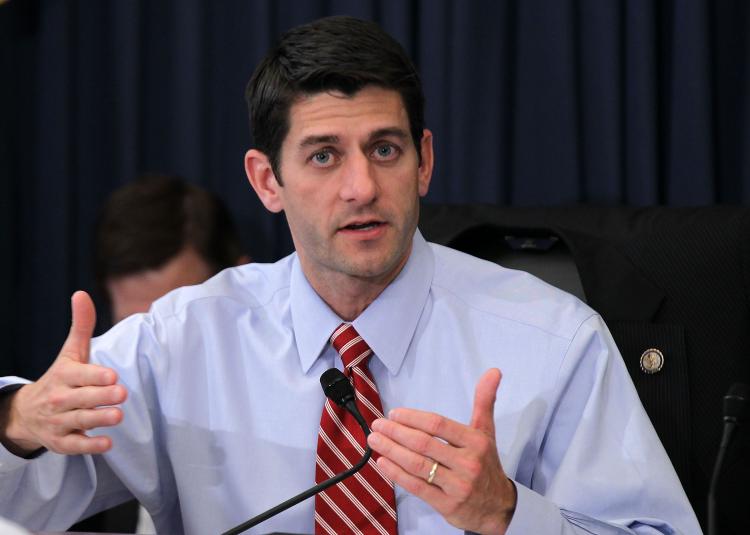WASHINGTON—A budget bill that tears down the foundation of both senior and poor Americans’ health care security passed in the House of Representatives on April 15 with near unanimous support from Republicans and complete opposition from Democrats.
The Path to Prosperity, crafted by House Budget Committee Chairman Paul Ryan (R-Wis.), would cap government spending on Medicare and Medicaid, and transfer costs in the form of higher health premiums and reduced care for millions of Americans.
Republicans argue that America can no longer afford the same health social safety net as enjoyed in the past. They argue an aging population and health care innovations, which prolong lives with the help of expensive drugs and technology make the programs unsustainable.
“It’s time that America develop a plan to save the next generation, and I believe that the budget we will consider this week in fact does that, said House Speaker John Boehner (R-Ohio) prior to the vote.
Ryan’s plan would cap current government spending on Medicare, which pays for services for seniors and the disabled, at a fixed rate. Medicare payments would go directly to insurance companies. Individuals would get vouchers to pay for part of private health insurance premiums.
Hospitals and doctors would then collect their remuneration from insurers. The program would give greater power to insurers to decide what and how much coverage an individual can receive.
The change would apply to Americans currently 55 and younger, and would result in rising premiums for individuals wanting the same level of care as what is currently offered.
With Medicaid, the Ryan proposal would again cap the costs, but turn federal payments into block grants to be transferred directly to states. The responsibility would then fall to individual states to deliver the services, supposedly with greater flexibility. Medicaid is meant for people in poverty, including children.
In a speech last week, President Obama strongly criticized the Republican approach, saying that it ends health care as we know it, and leaves Americans to fend for themselves.
“It says that 10 years from now, if you’re a 65-year-old who’s eligible for Medicare, you should have to pay nearly $6,400 more than you would today. It says instead of guaranteed health care, you will get a voucher. And if that voucher isn’t worth enough to buy insurance, tough luck—you’re on your own. Put simply, it ends Medicare as we know it,” Obama said.
Scott Lilly, a senior fellow with the Center for American Progress, said the Republican’s passage of the bill has opened up the budget debate and helped Americans to understand their choices.
While characterizing Ryan’s particular proposal as “extreme,” Lilly agreed that the “real choice is to substantially reduce the level of support or you raise the taxes to pay for those benefits.”
Ryan’s plan is heavy on the side of spending cuts and light in terms of revenue, or raising taxes. In fact, the budget calls for a permanent extension of the Bush tax cuts for all Americans.
“[W]e can’t tax the very people that we expect to reinvest in our economy and to create jobs. Washington has a spending problem, not a revenue problem,” Boehner said.
The president said in his fiscal speech that he “refuses” to extend cuts to individuals with income over $200,000 and to households with combined incomes over $250,000 thousand per year.
Steve Bell, a budget expert with the Bipartisan Policy Center, said he thinks Ryan’s plan is “pretty gutsy” but that ultimately, a compromise will have to be reached.
“The specific elements of Paul Ryan’s budget are not nearly as important as people are trying to make it out to be,” said Bell.
“It is merely the beginning of the discussion. Somebody had to jump into the water first to see how deep it was and how cold it was, and Ryan did it,” said Bell.
Many commentators have questioned whether it was wise for the Republicans to pass The Path to Prosperity when Americans have traditionally resisted any suggestion of a loss of benefits to programs like Medicare.
“The fact that all except four Republicans voted for the bill shows that a lot of them strongly believe in it, and a number of them are from districts where this actually might be popular,” said Lilly.
Members of Congress are now back in their districts for two weeks over the Spring break. During that time, many will be pressed to explain to their constituents votes and decisions taken over the past weeks of tough budget negotiations, which finally yielded an agreement on a 2011 budget resolution to fund the government through Sept. 30.
They will also be taking the temperature in advance of the next debates involving debt reduction and the 2012 budget, as well as a necessary vote on raising the government debt ceiling, which U.S. Treasury Secretary Timothy Geithner has warned must be dealt with by June at the latest.
The Path to Prosperity, crafted by House Budget Committee Chairman Paul Ryan (R-Wis.), would cap government spending on Medicare and Medicaid, and transfer costs in the form of higher health premiums and reduced care for millions of Americans.
Republicans argue that America can no longer afford the same health social safety net as enjoyed in the past. They argue an aging population and health care innovations, which prolong lives with the help of expensive drugs and technology make the programs unsustainable.
“It’s time that America develop a plan to save the next generation, and I believe that the budget we will consider this week in fact does that, said House Speaker John Boehner (R-Ohio) prior to the vote.
Ryan’s plan would cap current government spending on Medicare, which pays for services for seniors and the disabled, at a fixed rate. Medicare payments would go directly to insurance companies. Individuals would get vouchers to pay for part of private health insurance premiums.
Hospitals and doctors would then collect their remuneration from insurers. The program would give greater power to insurers to decide what and how much coverage an individual can receive.
The change would apply to Americans currently 55 and younger, and would result in rising premiums for individuals wanting the same level of care as what is currently offered.
With Medicaid, the Ryan proposal would again cap the costs, but turn federal payments into block grants to be transferred directly to states. The responsibility would then fall to individual states to deliver the services, supposedly with greater flexibility. Medicaid is meant for people in poverty, including children.
In a speech last week, President Obama strongly criticized the Republican approach, saying that it ends health care as we know it, and leaves Americans to fend for themselves.
“It says that 10 years from now, if you’re a 65-year-old who’s eligible for Medicare, you should have to pay nearly $6,400 more than you would today. It says instead of guaranteed health care, you will get a voucher. And if that voucher isn’t worth enough to buy insurance, tough luck—you’re on your own. Put simply, it ends Medicare as we know it,” Obama said.
Scott Lilly, a senior fellow with the Center for American Progress, said the Republican’s passage of the bill has opened up the budget debate and helped Americans to understand their choices.
While characterizing Ryan’s particular proposal as “extreme,” Lilly agreed that the “real choice is to substantially reduce the level of support or you raise the taxes to pay for those benefits.”
Ryan’s plan is heavy on the side of spending cuts and light in terms of revenue, or raising taxes. In fact, the budget calls for a permanent extension of the Bush tax cuts for all Americans.
“[W]e can’t tax the very people that we expect to reinvest in our economy and to create jobs. Washington has a spending problem, not a revenue problem,” Boehner said.
The president said in his fiscal speech that he “refuses” to extend cuts to individuals with income over $200,000 and to households with combined incomes over $250,000 thousand per year.
Steve Bell, a budget expert with the Bipartisan Policy Center, said he thinks Ryan’s plan is “pretty gutsy” but that ultimately, a compromise will have to be reached.
“The specific elements of Paul Ryan’s budget are not nearly as important as people are trying to make it out to be,” said Bell.
“It is merely the beginning of the discussion. Somebody had to jump into the water first to see how deep it was and how cold it was, and Ryan did it,” said Bell.
Many commentators have questioned whether it was wise for the Republicans to pass The Path to Prosperity when Americans have traditionally resisted any suggestion of a loss of benefits to programs like Medicare.
“The fact that all except four Republicans voted for the bill shows that a lot of them strongly believe in it, and a number of them are from districts where this actually might be popular,” said Lilly.
Members of Congress are now back in their districts for two weeks over the Spring break. During that time, many will be pressed to explain to their constituents votes and decisions taken over the past weeks of tough budget negotiations, which finally yielded an agreement on a 2011 budget resolution to fund the government through Sept. 30.
They will also be taking the temperature in advance of the next debates involving debt reduction and the 2012 budget, as well as a necessary vote on raising the government debt ceiling, which U.S. Treasury Secretary Timothy Geithner has warned must be dealt with by June at the latest.






